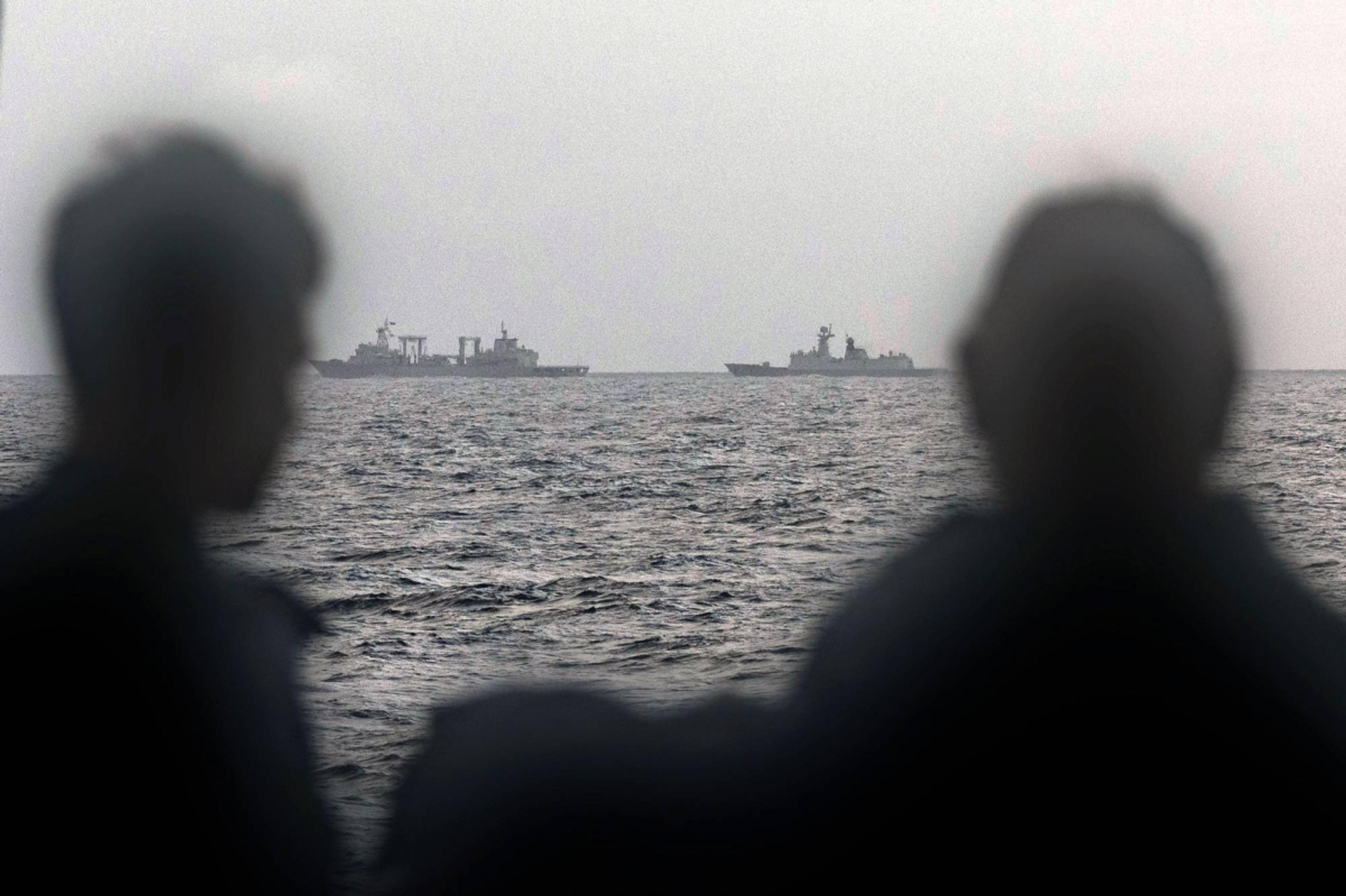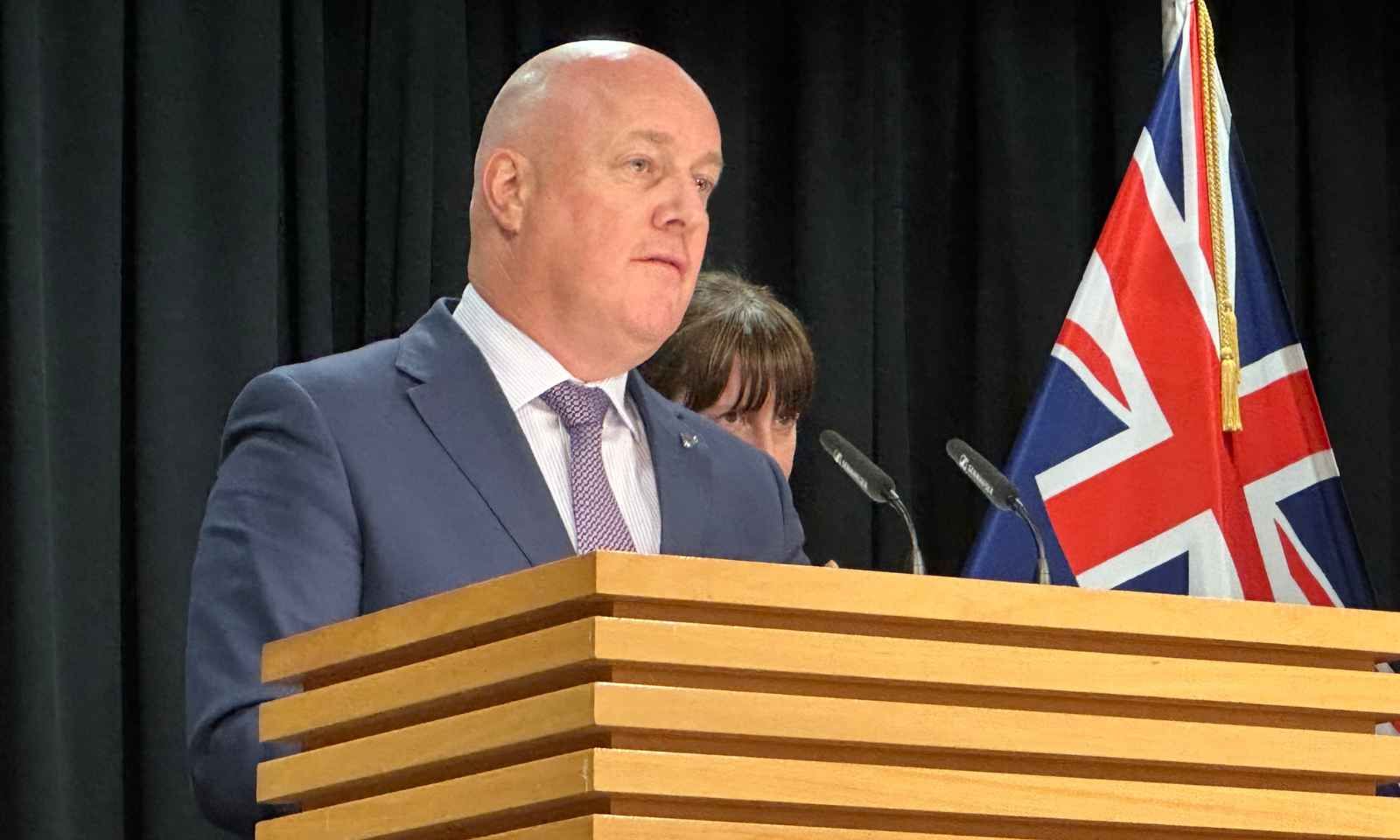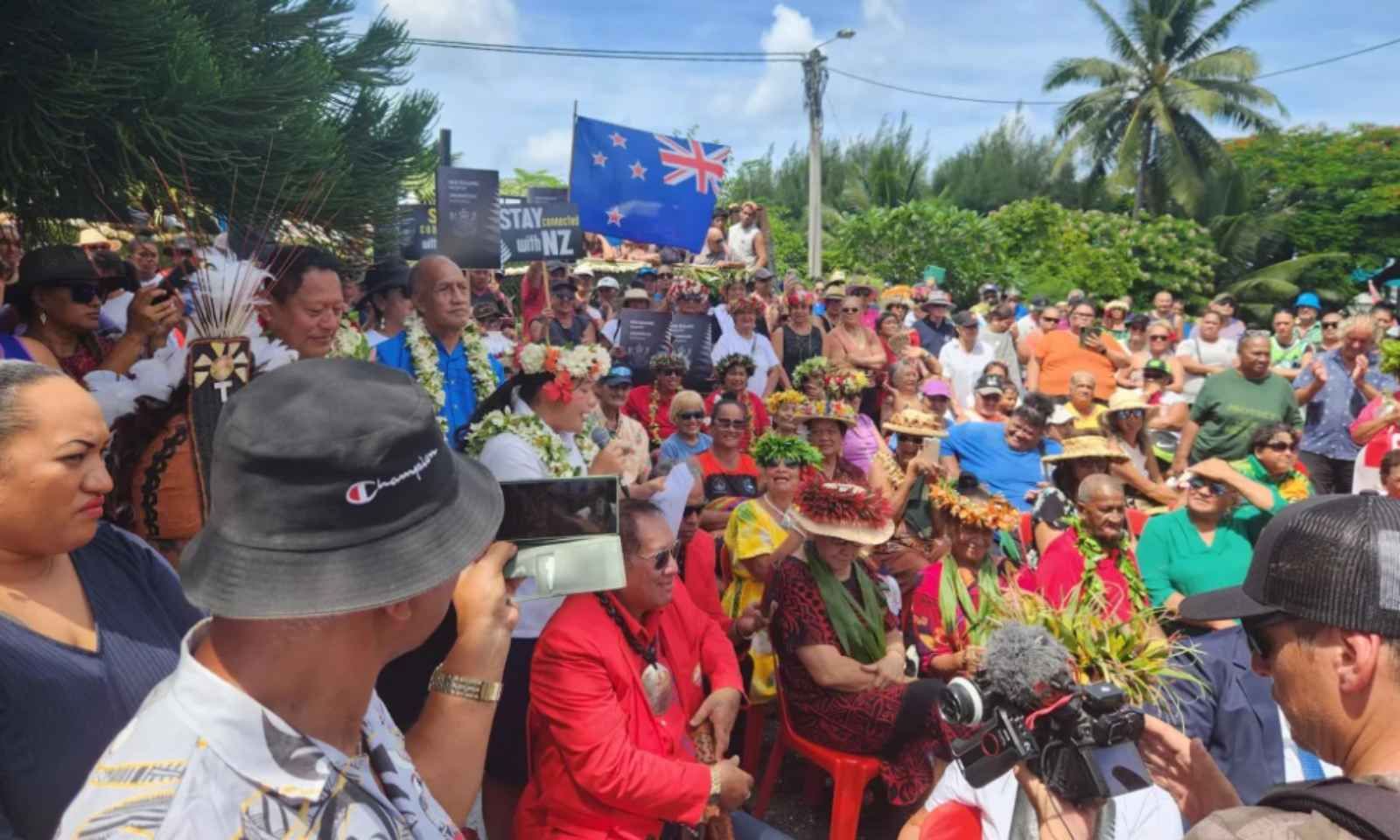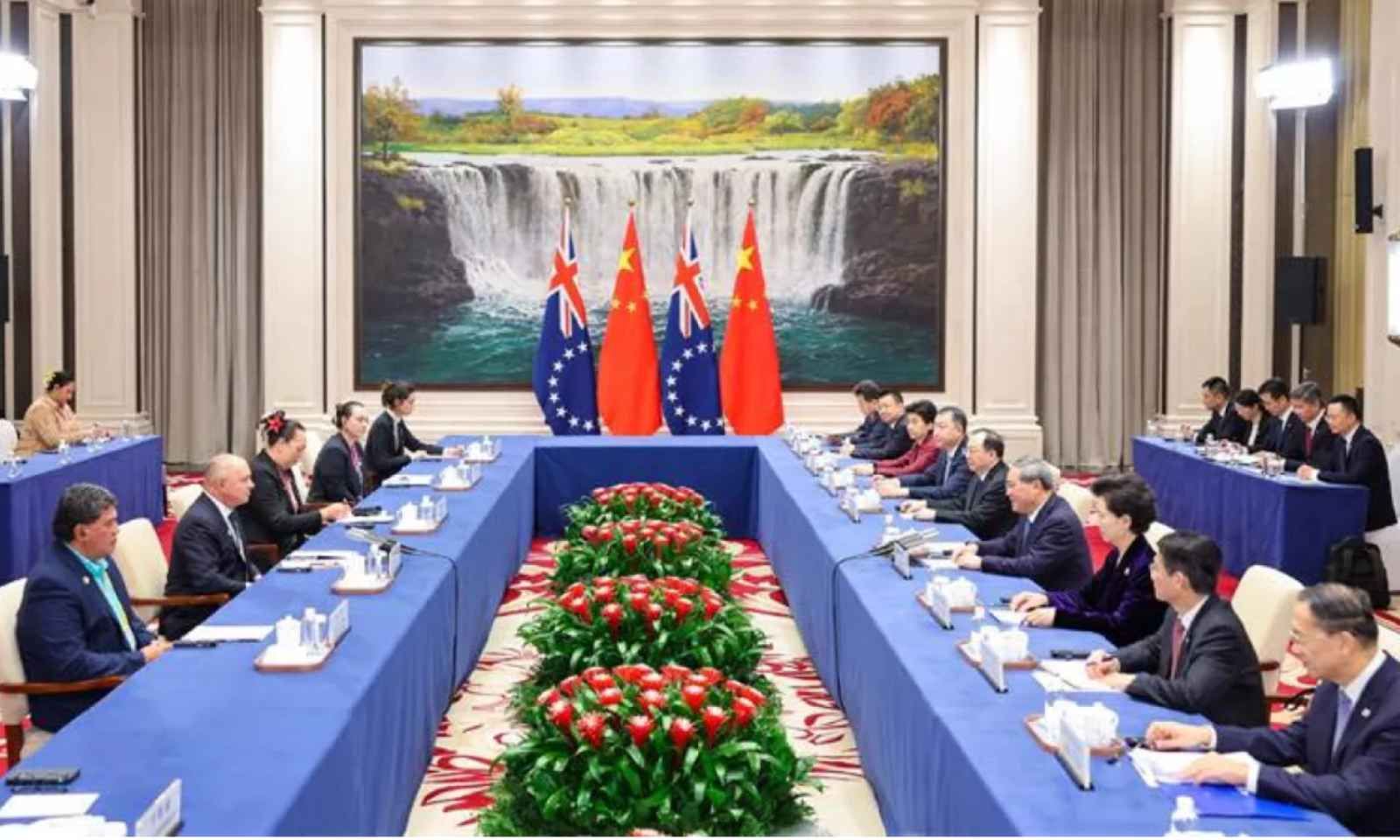

Cook Islands Prime Minister Mark Brown, far left, returned from his visit to China ealrier this week.
Photo/Cook Islands Office of the Prime Minister
Double standard? NZ criticises Cook Islands' China deal while backing US ties
Prime Minister Christopher Luxon dismisses notions of a double standard over New Zealand’s criticism of Cook Islands ties with China while backing closer relations with the United States.



Peters backs visa reforms for Pacific nationals ahead of petition handover

Pacific's missing piece: Why US-China rivalry lacks legitmacy, not just power - experts reveal

‘We can’t be the police’: Papatoetoe by-election tests voter confidence



Peters backs visa reforms for Pacific nationals ahead of petition handover

Pacific's missing piece: Why US-China rivalry lacks legitmacy, not just power - experts reveal

‘We can’t be the police’: Papatoetoe by-election tests voter confidence
Prime Minister Christopher Luxon rejects suggestions of a double standard in New Zealand’s stance on the Cook Islands' partnerships with the United States (US) and China.
On 18 February, the Cook Islands government released a controversial agreement it signed with China last week.
Talks between the Cook Islands, a self-governing territory in free association with New Zealand, and China sparked a 'diplomatic row' over Wellington's claims of a lack of transparency.
But documents released under the Official Information Act (OIA) in 2023 show that New Zealand was "supportive of deeper engagement by the Cook Islands" in international affairs and within the international community, after the US announced it would establish diplomatic relations with the Pacific island nation.
A Ministry of Foreign Affairs and Trade (MFAT) document says it is up to "the Governments and people of the Cook Islands and Niue to determine the next step in their self-determination journeys".
When asked by PMN News whether this suggested a double standard by New Zealand regarding relations between the Cook Islands and China, Prime Minister Luxon said the issue was about transparency.
"We have a genuine difference here because under free association, under our constitutional arrangements, we have clear rights and responsibilities, and we have a responsibility around defence, foreign affairs, and security,” says Luxon.
“What we expect is transparency and upfrontness about what's going on and what's been proposed because we do have obligations around defence and security we need to make sure are well managed."
Speaking with William Terite on Pacific Mornings, Anna Powles, an Associate Professor and Pacific defence and security expert at Massey University, says many have been considering whether the actions of New Zealand can be viewed as a double standard.
"It's a really good question that many of us have been pondering since this diplomatic row, for want of a better term, spilled over," she says.

Luxon spoke to media in a post-Cabinet press conference earlier this week. Photo/Ala Vailala
"A lot of this comes back to the interpretation of the 2001 joint declaration between New Zealand and the Cook Islands, which calls for consultation on issues which may be of national interest to either party."
Powles says while the declaration recognises that the Cook Islands acts as an independent country in its foreign relations, there has been a perception that consultation has been inadequate.
"Is it a double standard? I know there were certainly frustrations around the time of the United States stating it recognises the Cook Islands as an independent country in order to elevate its access to USAID funds.
"There were certainly some frustrations around the way in which that was conducted, but what it does reflect is the fact that it is a different strategic environment than it was back in 2001. Helen Clark referred to it back then as a benign environment.”
Powles does not think many leaders in the region would suggest it remains as such today.
“There are strong geopolitical concerns in the region, if only for the fact that geostrategic competition is increasingly disruptive and increasingly undermining the existing regional architecture where Pacific leaders have sought to establish over the past 40 odd years.”
Watch Anna Powles' full interview on Pacific Mornings below.
Action plan short on detail
Analysts warn that the Action Plan 2025 -2030 for the Comprehensive Strategic Partnership, while long on ambition, is short on detail, and it could allow for geopolitical manoeuvring and reshaping of the Pacific region.
Powles says provisions in the plan are significant because they involve multilateral engagement.
She says China is positioning itself as a dominant regional governance player.
“China is seeking seabed minerals and rare earth minerals, and that is certainly not new,” says Powles.
“That is something the Cook Islands can offer in abundance and has suggested a strong willingness to do so.
“So, it's access to resources, both seabed as well as fisheries, too, that is mentioned in the agreement.

Cook Islands Prime Minister Mark Brown. Photo/Google Earth/Mark Brown Facebook
“But this is also about China's broader ambitions and strategies within the Pacific Islands region to effectively shape the region in a way which is more favourable for their engagement.
“We see this in the action plan, where there is specific reference to China and the Cook Islands engaging in advanced discussions prior to the Cook Islands hosting of regional meetings that China normally attends, such as the Pacific Islands Forum meetings, leaders’ meetings and others to identify ways in which the two countries can support each other and advance their collective interests.
“We see a much closer alignment between the Cook Islands and China within that multilateral space within the Pacific.
“And this very much fits into China's efforts to shape the regional environment in a way that is favourable to their interests.”
The agreement emphasises significant economic opportunities for the Pacific island nation and focuses on trade expansion, infrastructure development, and environmental sustainability.

Protesters outside the Cook Islands parliament on Tuesday, calling on the government to reconsider its decision. Photo/RNZ Pacific
Geopolitical competition
New Zealand officials have expressed concern over the lack of consultation, with some arguing the agreement undermines traditional diplomatic protocols.
Speaking on Pacific Mornings, law academic Al Gillespie notes the secrecy surrounding the negotiations has caused diplomatic friction.
“It's a low-level agreement, but the relationship between the Cooks and New Zealand requires not only an obligation to consult, but in international law, that obligation to consult must be carried out in good faith,” Gillespie says.
“That means the two countries can rely on each other and build confidence and relationship with the Cooks.
“It goes back for such a long period, and it's not just legal or political, it's cultural as well. Much of that has been undermined by what's happened in recent times.
“I think there's always areas for cooperation with non-traditional partners in the region, but it should have been done in a much different way than what's happening right now.

Gillespie is currently the pro vice-chancellor for research and professor of law, specialising in international law related to war, the environment and civil liberties, at the University of Waikato. Photo/University of Waikato
“People need to remember the politics of aid and assistance right now are very volatile globally.
“I think if the Cook Islands had tried to do this trick with America, they would have found that much of their assistance would have disappeared.”
Seabed mining and China’s resource interests
One of the most contentious aspects of the partnership is China’s potential role in the Cook Islands’ seabed mining industry, a sector that has drawn both regional and international scrutiny.
The deal references exploring areas for further cooperation in seabed minerals, sparking concerns Beijing could gain privileged access to the industry.
Powles says seabed mining is inherently geostrategic. “So, there are long-term security implications for that.
“We know there is intensifying competition for seabed minerals and rare earth minerals in general and can certainly foresee increased geostrategic competition in that space.
“There's also concerns that the development of the marine infrastructure in the Northern Cooks could potentially have security implications.
“The Cook Islands Government has previously stated that China will assist in the development of a multi-use transport hub in the Northern Cook Islands.
“So that will obviously be of some concern.
“While there aren't any specific short-term security implications like we've seen, for instance, with China and the 2022 agreement between China and Solomon Islands, there are references to security cooperation on issues such as transnational crime and cybercrime.
“And, of course, we know from over the past couple of weeks that the recent cyber attack in Palau was attributed to a Chinese state-backed hacker group. So, there are certainly some security implications there.
However, transparency concerns persist, particularly since the full Memoranda of Understanding (MOU) signed in Beijing has not been released.

Cooks Islands and Chinese officials meet last weekend. Photo/Photo/MFAI Cook Islands
New Zealand’s reaction
New Zealand has taken a cautious approach in its response, balancing its long-standing relationship with the Cook Islands while raising concerns about transparency and consultation.
Following the release of the plan, New Zealand’s Foreign Affairs Minister Vaovasamanaia Winston Peters announced that further proceedings are underway to assess the agreement’s contents and implications for New Zealanders, Cook Islanders, and the wider Realm.
“We note, from various public statements by the Governments of the Cook Islands and China, that they signed a number of agreements last week,” Peters says.
“We look forward to the release of all those agreements without delay so that the Cook Islands people and New Zealand can get clarity on the substance and scope of the intended cooperation between China and the Cooks.
“Consultation and transparency must lie at the heart of the New Zealand-Cook Islands relationship.”